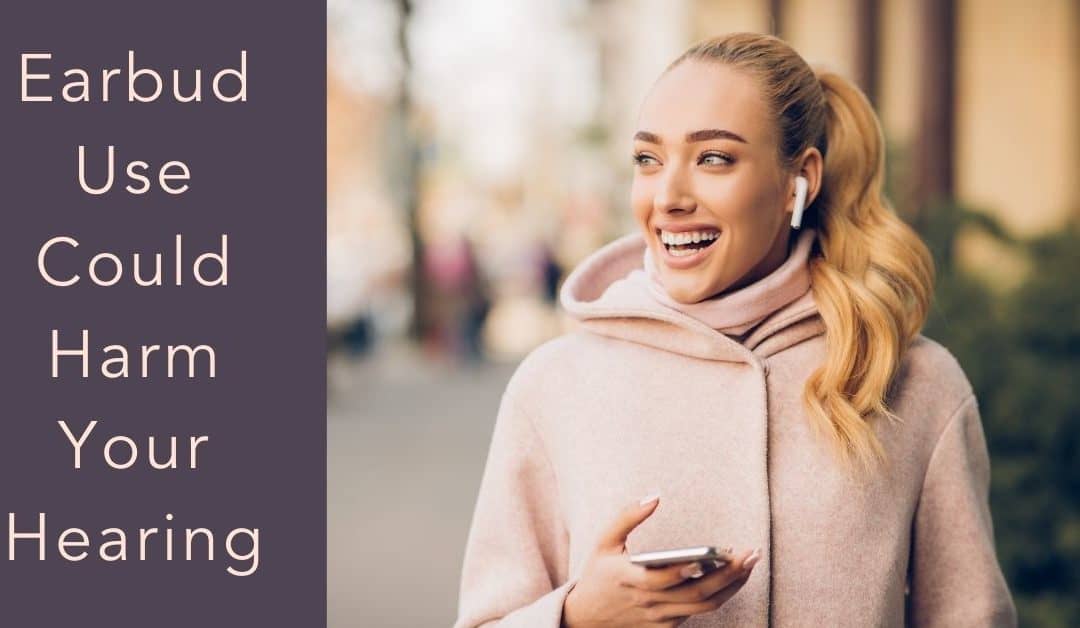Earbud use has become part of daily living. Listening to music, podcasts, or audiobooks using earbuds is often part of commuting to work, travel, working from home etc. Additionally, you could be using earbuds while exercising and talking on the phone. Earbuds have become one of the most accessible ways we can listen to audio and simultaneously multitask. Though they can be incredibly convenient and relatively inexpensive, they can also potentially be harmful for your hearing. A major cause of hearing loss is exposure to loud noise which can result in permanent damage. It is important to be aware of your earbud use and ways you can protect your hearing health
Noise Induced Hearing Loss
Hearing loss is a pervasive medical condition that impacts nearly 1 in 8 people in the U.S. There are various factors that can contribute to its development including aging, genetic history, existing medical conditions, and environmental exposure to loud noise. Absorbing loud noise, one time or on a consistent basis, can damage the hair cells in the inner ear. There are thousands of hair cells in each ear which help translate soundwaves into electronic signals. These signals are then sent to the brain to be processed which is how we are able to understand what we hear.
The louder the sound, the more intense the movement is of the hair cells. Hair cells need time to rest and recover from this movement or they could lose sensitivity and die. This kind of damage is permanent because hair cells, unlike other types of cells, do not regenerate. When they are damaged, hair cells cannot effectively translate soundwaves so it is much more difficult for the brain to process incoming sound. This results in noise induced hearing loss, a permanent health condition that is incurable.
Impact of Earbud Use on Hearing
According to the World Health Organization (WHO), 1.1 billion teenagers and young adults globally are at risk of hearing loss caused by absorbing unsafe levels of noise from electronic devices. They estimate for people between the ages of 12-35:
- nearly 50% are exposed to unsafe levels of sound from audio devices
These significant statistics reveal the increased risk caused by unsafe earbud and headphone use. So how loud is too loud?
Sound is measured in units referred to as decibels (dB). Noise above 85dB can be harmful to hearing. To have a greater sense of how loud this is, you can refer to this scale:
- 0dB: near complete silence
- 50dB: normal conversation
- 70dB: vacuum
- 110dB: car horn
- 120dB: concert
- 140dB: fireworks
We can be exposed to high levels of sound daily: household appliances, traffic, and of course; earbud use. Depending on your settings, earbuds can easily project sound that is near and/or above 85dB. This means that you could be regularly absorbing sound that is too loud and could be damaging your hearing. Earbuds are particularly risky for hearing health because they sit in the ear and are even closer to the inner ear which houses sensitive hair cells. It is critical to be mindful of volume and ways to protect your hearing health!
Protect Your Hearing Health
There are numerous ways to reduce your risk of noise induced hearing loss including the following:
- Volume Control: make sure that you maintain lower volume settings on your devices (smartphone, speaker, laptop etc.). If you are ever unsure, you can download an app to actually measure the decibels!
- Noise Cancelling Headphones: are designed to reduce background noise which prevents you from increasing the volume in environments that are noisier. This allows you to maintain a safe volume level.
- Take Listening Breaks: your ears need time to rest and recover from constantly absorbing and processing sound. So be sure to take listening breaks throughout the day.
- Wear Protective Gear: such as earmuffs and earplugs which serve as a barrier that reduces the amount of noise you collect. This is particularly helpful when you are in loud settings (arenas, concerts, construction sites, airports etc.)
By practicing these safety measures, you can reduce your risk of developing impaired hearing and protect your hearing health!

